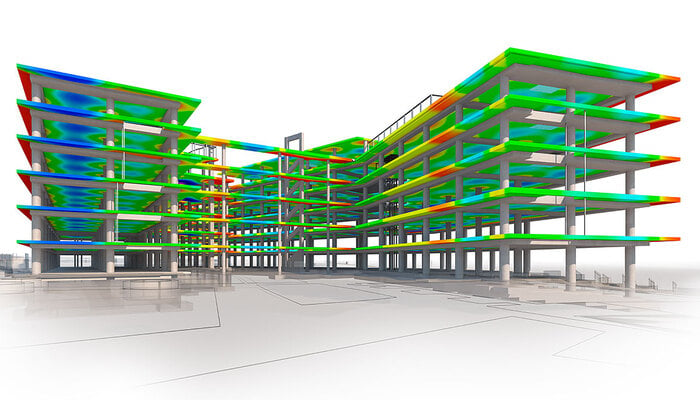Top 20 FAQs on BIM for Civil Engineers in 2026

Table of Contents
If you are pursuing a career in the Architecture, Engineering, and Construction (AEC) industry, we have some good news!
The average annual growth of job opportunities in the global AEC domain is projected to reach 5% by 2026. And this percentage is expected to exponentially grow in the near future, suggests a report by ConstructionPlacements. This implies that the industry is flourishing and that there exists an ample amount of work and learning opportunities for all. Also, thanks to technology, new niches and work avenues are opening up for professionals, allowing everyone to carve an exciting career for themselves.
For example, if you are a modern-day civil engineer, you have a bag full of specialisations such as structural engineering, geotechnical engineering, transportation engineering, and construction management that you can choose from. But, if you are looking for the most rewarding career as a civil engineer, we would recommend you consider specialising in Building Information Modelling (BIM).
What is BIM?

Building Information Modelling (BIM) is a digital process that involves creating a detailed 3D representation of a building or infrastructure, enriched with information about its components and properties. This intelligent model serves as a central hub, allowing architects, engineers, construction professionals, and other stakeholders to collaboratively design, visualise, and analyse the project in a virtual environment before construction begins.
How is BIM Used by Civil Engineers?
Civil engineers use BIM as a powerful tool to create detailed 3D models of infrastructure projects, encompassing everything from roads and bridges to water systems and dams. These digital representations allow engineers to visualise the entire project comprehensively, aiding in better design decisions and highlighting potential clashes or conflicts in the early stages. BIM enables precise quantity take-offs, cost estimations, and resource planning, providing invaluable insights that enhance project efficiency and budget management.
Furthermore, BIM supports civil engineers in analysing and simulating different scenarios, enabling them to assess the project's performance under various conditions. Whether it's evaluating traffic flow for a new road or analysing the structural integrity of a building, BIM offers simulations that can foresee potential issues and allow for adjustments to be made before construction commences. Additionally, BIM assists in project documentation, offering a centralised platform where all project-related data, specifications, and changes are documented and easily accessible.
Also Check : What is BIM in Civil Engineering & Why do Civil engineers love it?
Top 20 FAQs on BIM for Civil Engineers
The adoption of BIM is rapidly increasing across the AEC sector. Let’s have a look at the top 20 FAQs on BIM for civil engineers.

1. Is Learning BIM Useful For Civil Engineers?
Absolutely yes. Learning BIM is incredibly useful for civil engineers due to the significant impact it has on the construction industry. BIM allows engineers to create detailed 3D models of structures, providing a comprehensive view of the project. This aids in better visualisation, design coordination, clash detection, and more accurate cost estimation. Moreover, BIM skills are increasingly in demand, making civil engineers with BIM proficiency highly sought after in the job market.
2. Can a Civil Engineer Become a BIM Engineer?
Yes, a civil engineer can transition into a BIM engineer role by acquiring the necessary skills and knowledge. BIM engineers primarily focus on using BIM software to create, manage, and analyse digital models of structures. Civil engineers already possess a solid understanding of construction principles, which is advantageous when learning BIM.
3. What is the Scope of BIM After a BE in Civil Engineering?
Building Information Modelling (BIM) is a digital process that involves creating and managing a 3D model of a building or infrastructure, enriched with data about its components. The scope of BIM after a bachelor's in civil engineering is extensive. Civil engineers can use BIM for 3D modelling, quantity take-offs, structural analysis, and even facility management. BIM expertise enhances employability and offers roles like Structural engineers, Quantity surveyors, BIM coordinators, BIM modellers, project managers, or even BIM consultants.
Also Check : Type of jobs and salary civil engineers can get with BIM
4. What is BIM Software and How Does it Help Civil Engineers in Their Careers?
BIM software, such as Revit, AutoCAD Civil 3D, Navisworks, and Staad Pro, enables the creation and management of 3D models with rich information. Civil engineers use BIM software to design and simulate structures, analyse data for accurate decision-making, collaborate with teams in real time, and optimise projects for efficiency and cost-effectiveness. These tools integrate various aspects of a project, aiding in seamless coordination and error reduction, ultimately enhancing a civil engineer's productivity and career growth.
5. What is the Future of a BIM Civil Engineer?
The future of a BIM civil engineer is promising. With the construction industry increasingly adopting BIM methodologies, BIM engineers will play a critical role in project management and execution. BIM's data-centric approach will lead to better-informed decision-making, streamlined processes, and improved project outcomes. As sustainable and smart building practices continue to evolve, BIM engineers will be at the forefront, shaping the future of construction with data-driven and efficient projects.
6. Is it Worth Learning BIM as a Civil Engineer From a Job Perspective?
Yes, learning BIM is worth it from a job perspective. It is also a smart decision for freelancers and small-scale firms. Many construction and engineering firms like AECOM, Atkins, and Henning Larsen are now adopting BIM due to their proven benefits. Civil engineers with BIM skills are in high demand and often receive better job opportunities and higher salaries. BIM proficiency is a strong differentiator in a competitive job market and significantly enhances a civil engineer's career prospects.
7. How Can I Start Learning BIM for Civil Engineers?
To start learning BIM, consider taking accredited BIM courses offered by reputable institutions or online platforms. Novatr offers a comprehensive 7-month-long BIM course specifically curated for civil engineers that makes them profession-ready. These courses often cover the fundamentals of BIM, software training, and capstone project learnings offered by industry professionals. Additionally, you can explore online tutorials, and educational YouTube channels for basic knowledge. You can also think of joining professional organisations related to BIM that can provide valuable networking opportunities and access to industry knowledge.
8. What is the Fee for a BIM Course For Civil Engineers?
For a basic online BIM course, the fee could range from INR 10,000 to INR 30,000. More comprehensive and advanced courses from reputed institutes or universities could range from INR 50,000 to INR 2,00,000 or more. While selecting the course, it's important to evaluate your options based on course curriculum, fee, duration, and mode of learning.
Also Check : Salary comparison of Civil Engineer & BIM Engineer
9. Will BIM Replace Civil Engineers in the Future?
BIM will not replace civil engineers; rather, it will enhance their roles and capabilities. Civil engineers will continue to play a vital role in the industry, making crucial decisions based on the insights and data provided by BIM. BIM streamlines processes, improves collaboration, and optimises project management, enabling civil engineers to focus on higher-level tasks like design validation, structural analysis, and making informed decisions to ensure successful project outcomes.
10. Is it a Good Option to Start a Career in BIM After Civil Engineering in India?
Starting a career in BIM after civil engineering in India is an excellent way to advance your career. India's construction industry is rapidly adopting BIM, creating a demand for skilled professionals. In fact, the Indian government is also pushing for BIM in many large-scale public sector projects. So if you are thinking of learning BIM after a civil engineering course, now is the best time to do it.

11. Will Learning AutoCAD, Civil 3D, and Revit Help to Get a Job as a Civil Engineering Fresher?
AutoCAD is now a traditional software, so most civil engineering students know how to use it even in college. However other advanced software such as Civil 3D, Revit BIM, and Staad Pro can significantly enhance a fresher civil engineer’s employability. Many global firms value candidates with software skills, as they streamline the design process, enabling quicker project turnaround. Demonstrating competence in these tools during job applications and interviews can give you a competitive edge and increase your chances of landing a job in the industry.
12. Can a Student with a Diploma in Civil Engineering Study for BIM?
Yes, a student with a diploma in civil engineering can pursue studies in BIM and aim for a career as a BIM modeller. Many institutions offer diploma-to-degree or diploma-to-certificate programs in BIM. Employers are increasingly recognising the value of skills and knowledge in BIM, and a diploma holder with additional BIM training can be a viable candidate for entry-level positions in BIM modelling.
13. What is Best, to Study For an ME in Civil Engineering or to Study BIM?
Also Check : BIM Skills Companies are looking in Civil Engineers
The choice between pursuing a Master's in Civil Engineering (ME) or studying BIM depends on your career goals and interests. If you're passionate about design, structural analysis, or research, an ME in Civil Engineering might be suitable. On the other hand, if you're interested in digital technology, project management, and wish to work on large-scale projects, studying BIM can be a more direct route to your desired career in the construction industry.
14. Which Path is Better for a Civil Engineer Fresher- a BIM Modeller or a Site Engineer?
The better path depends on your likes, preferences, and career goals. Typically, a site engineer role allows for hands-on experience in construction and project management, essential for understanding real-world implementation. On the other hand, starting as a BIM modeller can lead to a specialised career in digital design and project coordination. The primary difference between both job profiles is your place of work and comfort. Having said that, both paths offer valuable experiences, and choosing the one that aligns with your interests and long-term objectives is key.
15. How Does BIM Find Application in Civil Engineering and Construction Management?
BIM finds extensive application in civil engineering and construction management by serving as a comprehensive digital tool that enhances project planning, execution, and management. BIM enables civil engineers and construction managers to create 3D models of structures and infrastructure, integrating various project components, including architectural, structural, and MEP (Mechanical, Electrical, Plumbing) systems. This digital representation facilitates collaboration and coordination among multidisciplinary teams, reducing errors and conflicts during the design and construction phases. BIM also aids in accurate cost estimation, project scheduling, and resource allocation. Moreover, it supports efficient facilities management by providing a wealth of information about the constructed assets thereby helping construction managers.
16. Which Institute is Good for Learning BIM and Revit Software for Civil Engineers?
Several institutes and online platforms offer quality training in BIM and Revit for architects and civil engineers. Notable institutions include Autodesk Authorised Training Centers, local universities offering BIM courses, and reputable online learning platforms like Novatr, Coursera, Udemy, and LinkedIn Learning. While selecting a course, it's important to consider factors such as course content, certification, industry relevance, and instructor expertise when choosing an institute or platform for BIM and Revit training.
17. What is the Average Salary Offered for a Civil Engineer After Completing a BIM course?
The average salary for a civil engineer after completing a BIM course can vary based on factors such as location, experience, and the specific role in the industry. Generally, having BIM skills can potentially lead to a higher starting salary compared to a civil engineer without BIM proficiency. On average, salaries for BIM-trained civil engineers can range from INR 5,00,000 to INR 10,00,000 per annum. There are opportunities for further increases as experience and expertise grow in the BIM domain.
18. What is the Scope for a Fresher Civil Engineer in BIM Outside India?
The scope for a fresher civil engineer in BIM modelling outside India is promising. Many nations are adopting BIM in their construction industry, creating a demand for BIM-skilled professionals. Fresher civil engineers with BIM training can explore opportunities abroad, especially in regions where BIM implementation is at its peak, such as Europe, North America, the Middle East, and parts of Asia.
19. In Which Areas Can I Work in the Field of BIM as a Civil Engineer?
BIM offers a multitude of career roles for civil engineers. You can work in structural engineering using BIM for detailed structural analysis and design. Additionally, BIM is great for resource allocation and planning which can help you build a career in project management. Additionally, you can focus on infrastructure design, encompassing roadways, bridges, and utility systems, where BIM aids in efficient planning and coordination. Moreover, sustainable design and energy analysis are emerging areas, allowing you to optimise projects for green building professionals.
20. I'm a Civil Engineer with “X” Years of Experience in Execution. How Can I Shift My Career from Execution to BIM?
Shifting your career from execution to BIM with any amount of experience is achievable with the right approach. You can begin by acquiring BIM skills through certified courses or workshops, focusing on BIM software and processes. This will help you tailor your resume and highlight your new BIM skills, emphasising how they can enhance project efficiency.
Also Check : Top 10 BIM Software for Civil Engineers
3 Best Online BIM Courses For Civil Engineers
If you are looking for trustworthy platforms to learn BIM, mentioned below is a list of courses that are most suited for civil engineers.
1. BIM Professional Course for Civil Engineers by Novatr
Duration: 7 months
Placement Support: Yes
Novatr offers a unique BIM course designed exclusively for civil engineers. This course delves deep into the world of BIM by providing extensive knowledge of Revit and over 10 BIM software, along with insights into industry workflows. Participants gain valuable insights into construction techniques and quantification, including precast, rebar, and project scheduling. Renowned industry experts conduct the course, enabling participants to apply BIM principles directly to their professional domains through RIBA-approved capstone projects.
BIM and Structural Design Analysis by IFS Academy
Duration: 4 months
Placement Support: Yes
The BIM and Structural Design Analysis course offered by IFS Academy at the postgraduate level is a comprehensive training program. Geared towards professionals seeking knowledge in structural engineering and construction design, the course encompasses a thorough understanding of BIM essentials, tools, software, methodologies, and best practices within the industry.
BIM Ready (Arch + Structure) by Techno Struct Academy
Duration: 4.5 months
Placement Support: Yes
Offered by Techno Struct Academy, this BIM course for civil engineers is industry-relevant. It prepares students for the evolving landscape of the AEC industry by equipping them with knowledge about real-world applications of BIM. It also provides insights into sustainable design and development, construction documentation, and project workflows. The course is led by industry experts and also offers the opportunity to work on a project in real time.
In Conclusion
Delving into the realm of Building Information Modelling (BIM) is no longer an option but a necessity for civil engineers. Through this exploration of the top 20 FAQs about BIM for civil engineers, we have unearthed the significance and diverse facets of BIM in the modern construction landscape. As the construction industry continues to evolve, embracing BIM is the key to staying relevant, and competitive, and leading the way towards a more sustainable and technologically advanced future.
If you are interested in learning BIM, do check out the BIM Professional Course for Civil Engineers by Novatr.


 Thanks for connecting!
Thanks for connecting!




.png)








